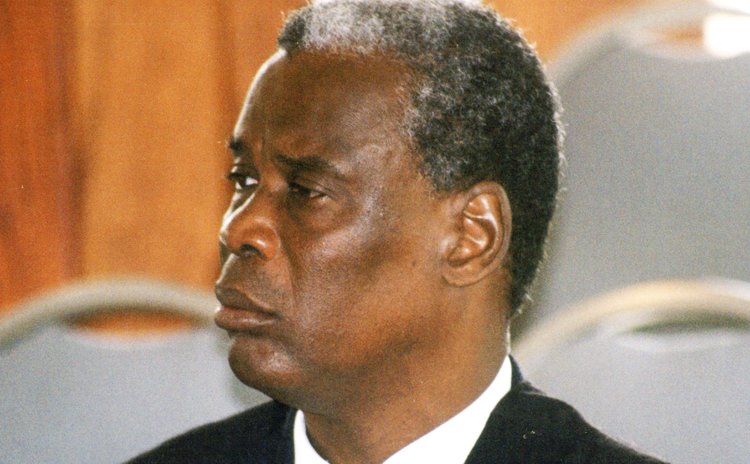The road to May 29th
Part Three

[Taken from a forthcoming book, Inside The Rebellion: Dominica 1979]
By William Para Riviere, Historian
"Those Who Do Not Remember the Past Are Condemned to Repeat It"
The last-minute appeal by the Unions was rejected. In these circumstances, on both sides of the divide preparations proceeded for what seemed to be a certain confrontation.
C.S.A Plan of Action
On May 25th the C.S.A met in emergency session and members voted to absent themselves from work on May 29th and, instead, assemble outside the House of Assembly so as to make known the scale of the Association's opposition to the intended measure. And, two days later, that is to say, on May 27th, a Joint Working Committee of the Unions took a unanimous decision to hold a public meeting in Roseau on the following night, in an effort to further mobilize support for their scheduled demonstration outside Parliament on May 29th. Political forces opposed to the regime also joined the mobilization effort. The Freedom Party held public meetings in Grandbay and in the environs of the capital city, while the Dominica Farmers Union and the island's peasantry stood fully on alert (122).
A section of the Progressive Movement organized inside the People's Democratic Party (P.D.P.) intensified its conscientizing activity among the unemployed youth, among progressive co-operatives and within select branches of the Farmers' Union. Further, the P.D.P made public its full support of the cause of the island's farmers. A release to the Chronicle Newspaper stated the Party's opinion that no less than the "practical unity" of the island's workers and farmers "can save our main industry and, indeed, our country." In an attempt to isolate the John regime internationally, it went on to send its General Secretary to the United Nations lobby rooms in the United States of America to inform U.N. members of the growing connection between Dominica and the apartheid South African regime. And it celebrated the protest actions thus: "The People's Democratic Party considers the march (29th January), the mass meeting (12th February) and other planned actions of the Dominica Farmers Union strengthened by the solidarity of the C.S.A, D.A.W.U, W.A.W.U and D.T.U as critically important and necessary new beginnings in the just struggle for democracy, peace and development in the Commonwealth of Dominica and, indeed, the Caribbean" (123). And the Dominica Committee for Human Rights (D.C.H.R), as it had done before to save the life of Rastafarian activist, Desmond Trotter, mobilized the international community against the undemocratic practices of the John regime. Government Reaction
The regime's response to these and other manifestations of protest was to reject compromise. Instead, it readied the security forces. On May 27th Premier John invited both the Chief of Police and the Commander of the Defence Force to attend an 8 o'clock early morning meeting on the following day with Attorney General Austin and himself. Evidently, the meeting discussed what was described as a "planned breakdown of law and order by the trade unions." The security chiefs were reminded of an earlier popular assault on Parliament that took place in 1971, when the LeBlanc regime sought to pass the Roseau Town Council Bill to severely whittle down the powers and jurisdiction of that body. And instructions were issued that their men "do everything possible" to prevent a recurrence of that event. At 5 o'clock in the afternoon the leadership of the Police Force and the Defence Force met at Police Headquarters to fine-tune strategy and tactics, in line with Prime Minister John's instructions. The preparations of the Security Forces culminated in an evening meeting at which the soldiers perfected their operational plan for the following day; in attendance were Commander Newton, Captain Reid, Lieutenant Dyer and Sergeants Durand and Blaize (124).
At the day's end Government took two further courses of action. One, a proclamation was issued, prohibiting the holding of public meetings and gatherings, from 6 o'clock in the morning of May 29th until June 4th. By the other, the police detachments stationed in Roseau were complemented by a force of thirty men called in from rural stations (125).
On the night of May 28th, the scheduled joint public meeting of the Trade Unions took place. Main speakers were Charles Maynard of the Church Council, Anthony Frederick Joseph of the Dominica Amalgamated Workers Union (D.A.W.U), Charles Savarin of the Civil Service Association (C.S.A), Curtiste Augustus of Waterfront and Allied Workers Union (W.A.W.U), and Atherton Martin of the Dominica Farmers' Union (D.F.U); in the chair sat W.A.W.U'S Louis Benoit. Quite noticeably, a Police Sergeant, Rita Seraphin, attended the meeting and took notes. Summarized, the meeting called on Government to, first, defer any amendment of the Industrial Relations Act and, second, remove Leo Austin from the positions of both Attorney General and Minister of Government. Also called for was abandonment of the Libel and Slander Bill. Of significance is that a suggestion that, because the ban on public meetings and gatherings was scheduled to go into effect at 6 o'clock on May 29th, the following day's demonstration ought properly to be mounted, privately, at Parish Hall in Goodwill, instead of, publicly, mounted, privately, at Parish Hall in Goodwill, instead of, publicly, downstairs of Government Headquarters, was rejected. Protestors would assemble at Government Headquarters (126).
Copyright © William Para Riviere, 2015




